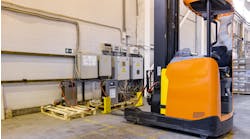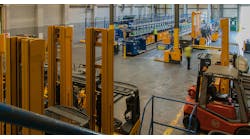Productivity: Terrorism Casualty?
America may never be the same after the tragedy of the Twin Towers and the arrival of international terrorism in Washington. Our national conversation, carried on in the media, is dominated by our new concerns with security and what may be a very long war. Many pundits are betting on a decline in American industrial competitiveness because of those vicious attacks.
A much surer bet is that there will soon be an increase in the number of seminars on safety and security in manufacturing — as well as in the number of “experts” on that topic. Meanwhile, the country’s plants and offices will be wide open to their message. A big question managers in manufacturing must ask themselves is “What will this new overlay of security systems and training cost?”
Productivity is not easy to gauge accurately. It’s not just the output per hour that counts. It’s also a measure of return on investment over time. These elements show up on the bottom line and tell a company’s complete productivity story.
Companies throughout the country have been beefing up security at their plants and offices, especially those of a more sensitive nature, such as defense suppliers and hazardous material users. These actions cover the whole spectrum of security issues including employee training, increased expenditures for guards and coordination with government authorities.
These items look like they’re all outgo, representing the increased costs of doing business. And, at first glance, it looks like one big negative for manufacturing productivity. Looked at more closely, and more inclusively, the real effects may be positive.
The productivity of shop workers may actually increase with increased security. Workers who feel secure tend to be able to concentrate more easily on the task at hand. And much of the work of non-shop employees, including management, may become more efficient as well. How? Air travel to events like technical seminars and trade shows has been cut drastically. Much of the time spent on such events was in travel. Others have noted that some events could be better attended via closed circuit television or the Internet.
Management and employees throughout the country are thinking about security in ways they never have. Given the creative record of American managers and workers over the years, productivity is more likely to rise than fall in coming months.
The cost of increased security will add to the cost of doing business — for everyone in America. The productivity changes of the thousands of manufacturing companies in the country, however, need not be negative. We have the technical wherewithal and the patriotism to move into this new manufacturing climate the way Americans always have. That’s with courage and common sense and that special knack for invention that has made the U.S. leaders in industrial competitiveness for generations.
America may never be the same, but America need not decline either. The nation’s manufacturing companies have amazed the world in war before and, I am confident, will continue to do so through this crisis and into the 21st century. I’m betting on America.
George Weimer
contributing editor


